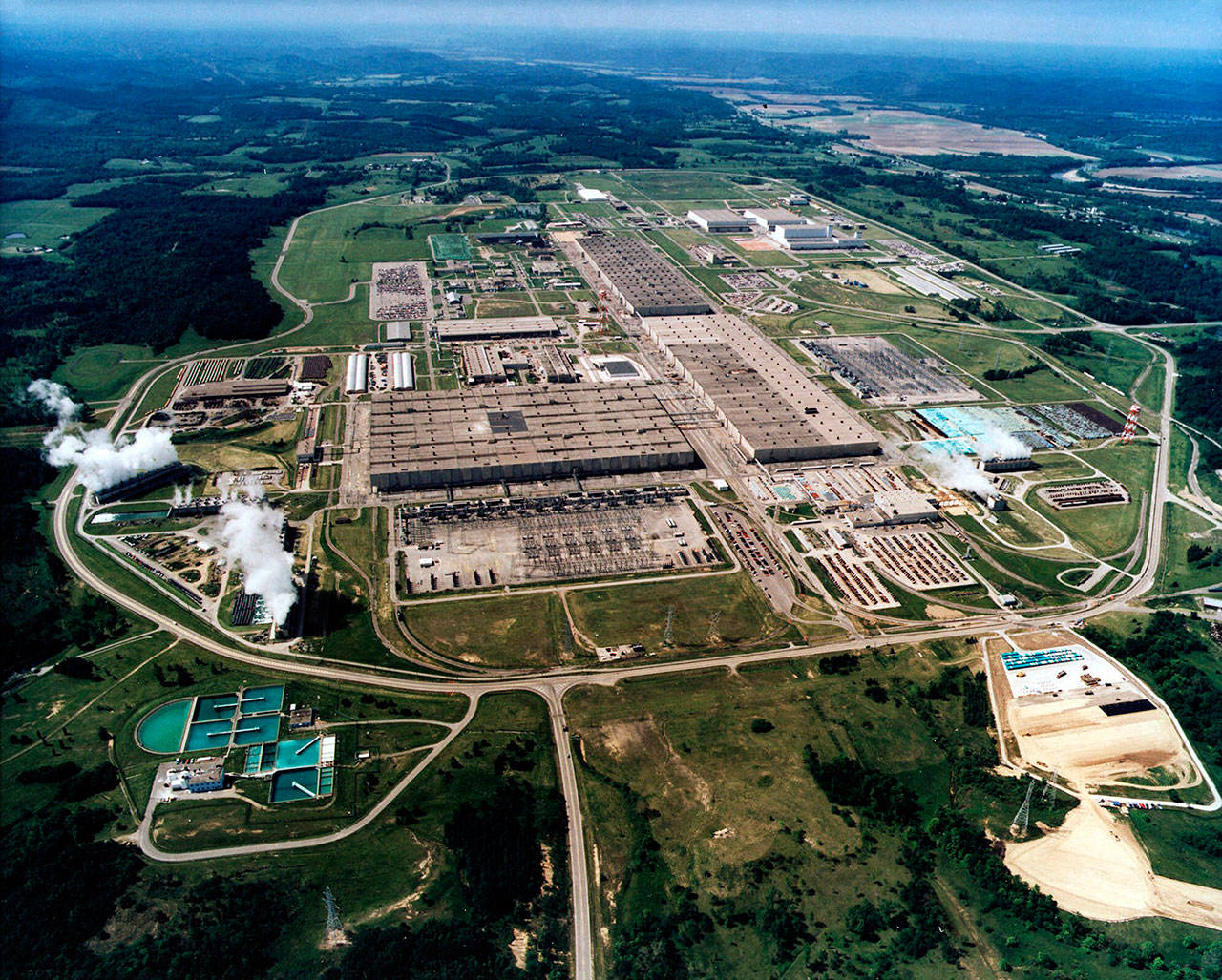By Ellen Knickmeyer, Felicia Fonseca and Mead Gruver / Associated Press
WASHINGTON — A plea from uranium mining companies and nuclear power plant operators for tax breaks and other federal financial boosts is going before President Donald Trump, as his administration studies reviving the U.S. uranium industry in the name of national security.
Trump is scheduled to receive recommendations Thursday from a task force of national security, military and other federal officials about ways to revive U.S. uranium mining, which has lagged against global competition amid low uranium ore prices.
Uranium is a vital component for the country’s nuclear arsenal, submarines and nuclear power plants. U.S. uranium users get about 10% of their supply from domestic sources, the federal Energy Information Administration has said. Most of the rest comes from Canada and Australia, followed by Russia and former Soviet republics.
U.S. uranium mining interests have pressured Trump to require uranium users to get 25% of what they use from domestic suppliers, saying the global market is vulnerable to geopolitical turmoil. Trump rejected the quota idea this past summer and gave the task force 90 days to come up with other ideas.
An Aug. 18 letter from the Nuclear Energy Institute industry group laid out the sector’s requests, including a recommendation for the Defense Department to procure more domestic uranium for military needs and for subsidies for electric utilities or uranium producers for the production of up to 3 million pounds (1.4 million kilograms) of partially processed uranium yearly.
Nuclear power plants, which have been suffering in the U.S. marketplace against cheaper natural gas and renewables, also are seeking assistance. Plant operators and utilities had opposed the production quota sought by mining interests.
“There are reactors out there that are financially in difficulty,” Matthew Wald, a Nuclear Energy Institute spokesman, said this week. “We would like to see a thriving domestic uranium industry … We don’t want something that will raise the costs of domestic reactors.”
If the Trump administration ever imposes sanctions against Russia, that could limit the U.S. uranium users can get from that country, said Curtis Moore, a spokesman for Colorado-based Energy Fuels Inc., a uranium mining company.
“Do we really want to put our energy security and national security in the hands of our adversaries? That’s just not smart policy,” Moore said.
But conservation groups and other opponents said the U.S. has enough uranium stockpiled to supply decades’ worth of defense needs. They argue the availability of high-quality imported uranium from close allies, including Canada, means more taxpayer support for the industry is unnecessary.
U.S. uranium producers want “the federal government to prop up their industry through enormous subsidies and self-serving quotas,” plus easing of environmental protections and the opening of more public land for mining, said Randi Spivak, public lands program director for the Center for Biological Diversity.
“It’s not a national security issue,” she said.
The nuclear power industry is “trying to leverage the ‘America First’ moment to get more government financial support for the operating fleet,” said Edwin Lyman, a nuclear expert with the Union for Concerned Scientists advocacy group.
Other industry requests to a working group made up of representatives from the Pentagon and agencies including the Commerce and Energy departments include vastly expanding a U.S. uranium reserve that could be tapped in times of supply disruption.
The American Assured Fuel Supply Reserve established in 2011 currently has six so-called “reloads” of low enriched uranium. A nuclear plant needs reloading with processed fuel at least every two years. The U.S. over the next seven to 10 years should expand the reserve to 30 reloads, or 25 million tons of partially processed uranium ore, the industries say.
Some uranium mining companies also have said Trump should reconsider his July decision not to limit imports by reserving 25% of U.S. uranium use for domestic producers.
The administration already has done plenty to ease environmental and other regulations and at this point, only tariffs and quotas would “move the needle” to help the industry, said Travis Deti, director of the Wyoming Mining Association, which represents the state’s mining companies.
Most uranium in the U.S., including all of it from Wyoming, is mined by pumping a solution of water and chemicals into uranium-bearing deposits underground. The water is then pumped to the surface and ore is extracted.
One of the richest known reserves of uranium ore spans parts of northwestern New Mexico. Previous booms in what was once known as the uranium capital of the world occurred during the 1950s and again in the 1970s. Environmentalists have been fighting to prevent future mining in the region and in Arizona around the Grand Canyon.
Amber Reimondo of the Flagstaff, Arizona-based Grand Canyon Trust says she fears moves to boost domestic uranium mining could end protections put in place during the administration of President Barack Obama for uranium-bearing lands outside Grand Canyon National Park.
Uranium mining in the Southwest during the atomic age left a legacy of death and disease, Reimondo said. Hundreds of uranium mines that dot the Navajo Nation, for example, have not been cleaned up. The tribe, whose reservation extends into New Mexico, Utah and Arizona, banned uranium mining and transport on its lands in 2005.
“When people talk about past uranium mining, they talk about it as if the problem is in the past, as if people aren’t still living with the consequences of uranium contamination and that uranium contamination can be segregated in some bubble when it just inherently lasts for longer than any of us can fathom,” she said. “We shouldn’t be meddling in that.”
— Fonseca reported from Flagstaff, Arizona and Gruver reported Cheyenne, Wyoming. Associated Press writer Brady McCombs in Salt Lake City and Susan Montoya Bryan in Albuquerque, New Mexico contributed to this report.
Talk to us
> Give us your news tips.
> Send us a letter to the editor.
> More Herald contact information.

























